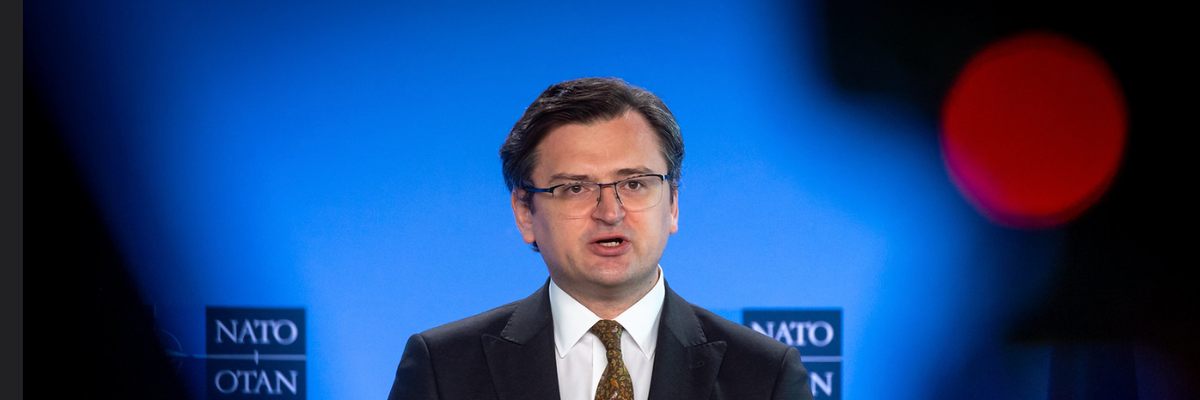The sentiments expressed in the article for Foreign Affairs this week by Ukrainian Foreign Minister Dmytro Kuleba are very understandable given the invasion, the destruction and the atrocities that Ukraine has suffered — but they must not become the basis for Western strategy.
Fury, however righteous, is not a good shaper of policy. Moreover, unlike Ukrainians, U.S. and Western officials and analysts are not themselves under the same kind of fire or threat. They have therefore no excuse for allowing their judgment to be clouded by emotion. Their professional duty to their own countries mandates keeping cool heads and strong nerves.
Kuleba seeks to identify the West with purely Ukrainian goals, irrespective of the wider costs to humanity. Parts of his article read very much as if American public relations professionals crafted the language. But the primary duty of American citizens is to their own country. Kuleba declares — in a gratuitously offensive fashion that:
“[M]ore and more Kremlin-leaning commentators are proposing to sell out Ukraine for the sake of peace and economic stability in their own countries. Although they may pose as pacifists or realists, they are better understood as enablers of Russian imperialism and war crimes.”
There is a great desire to help the Ukrainian people defend themselves from the illegal and brutal invasion. But the President of the United States is elected by American citizens, and has sworn an oath to defend them and their interests, too. That includes protecting the U.S. economy and keeping America out of conflicts that are not in the vital security interests of the United States, or confrontations that will lead to senseless devastation and killing overseas.
The most dangerous aspect of Kuleba’s article is the way in which he slips repeatedly between calling for Western military aid for “complete and total Ukrainian victory” and saying that this aid is intended to help the Ukrainians to put pressure on the Russian forces in order to make the Putin regime “negotiate in good faith” and help Ukraine negotiate “from a position of strength.”
These goals are obviously contradictory. If Ukraine can win a total victory, then there will be no need to negotiate anything with Russia except unconditional surrender — an extremely improbable military outcome. If however there are to be negotiations, then this will involve seeking some kind of at least provisional compromise. Indeed in March, the Ukrainian government offered a set of reasonable proposals that met some of Russia’s key demands. Are these still the official Ukrainian position or not?
Kuleba writes:
“[W]hether Russian troops choose to retreat or are forced to, Ukraine will be able to speak with Russia from a position of strength. We can seek a fair diplomatic settlement with a weakened and more constructive Russia. It ultimately means that Putin will be forced to accept Ukrainian terms, even if he denies it publicly.”
But what are “Ukrainian terms”? Last week, I heard a Ukrainian ambassador in Europe declare that Ukraine must fight for “twenty years, if necessary,” in order to expel Russia from all the territory it has held since 2014, including Crimea and the naval base of Sevastopol.
Since according to Russia, Crimea is now sovereign Russian territory, this is something which no Russian government, of any political complexion, can possibly agree to unless Russia has indeed been completely defeated militarily, and Russia will also fight on for 20 years if necessary to prevent this. Is this also Kuleba’s goal? If so, he should say so, in order that we in the West should know precisely what we are committing ourselves to in Ukraine.
Kuleba is even more contradictory in his portrayal of the Russian military threat. On the one hand, he states — quite rightly — that Ukrainian resistance backed by Western weaponry defeated the Russian army outside Kiev and stalled them in the Donbas, turning the conflict there into a grinding war of attrition for very small amounts of territory. He uses this to argue that more Western weaponry will help Ukraine to win a complete victory.
On the other hand, in his appeal for unconditional Western support, he needs to argue that the West is under mortal threat, and therefore paints a picture of Russian strength and universal menace that would have been exaggerated for the Soviet Union and Communism at the very height of their power and ideological ambition:
“Russia is a revanchist country bent on remaking the entire world through force. It actively works to destabilize African, Arab, and Asian states both through its own military and through proxies. These conflicts have created their own humanitarian crises, and if Ukraine loses they will only grow worse. In victory, Putin would be emboldened to stir up more unrest and create more disasters across the developing world. Putin’s increased aggression wouldn’t be limited to the developing world. Putin’s increased aggression wouldn’t be limited to the developing world. He would meddle with more vigor in U.S. and European politics. If he succeeds in conquering Ukraine’s south, he may march deeper into the continent by invading Moldova, where Russian proxies already control a slice of territory.”
How can a Russia that is facing the greatest difficulty in capturing a couple of small towns in the Donbas possibly pose this kind of threat? And is it really necessary to point out that it is in fact the United States — not Russia — that has at various times since the Cold War sought to “remake the world by force” and created vast humanitarian crises through its interventions? In the Middle East at least, it is Russia — not America —that has in fact acted as a status quo power.
This reminds me vividly of conversations and interviews during the various wars and civil wars in the Caucasus in the early 1990s, which I covered as a British journalist. Georgian supporters of President Zviad Gamsakhurdia portrayed their struggle with President Eduard Shevardnadze as essential for Western security against Russia, as did Azeris fighting Armenia for control of Nagorno-Karabakh — while Armenians on the other hand portrayed their Azeri enemies as spearheads of an Islamist wave that if not defeated in some wretched mountain village, would go on to conquer Paris and London. None of this bore the slightest relationship to reality.
Kuleba portrays this conflict as “existential” for Ukraine. At the start of the Russian invasion, there was a case to be made for this. Clearly the original Russian intention was to capture Kiev, subjugate or replace the Ukrainian government, and reduce Ukraine to a client state.
As Kuleba himself states however, this Russian strategy was comprehensively defeated. Today, the war in Ukraine has become a limited one for relatively small amounts of disputed territory in eastern and southern Ukraine. The collapse of empires and multinational states has created many such conflicts in modern history, from Kashmir to Kosovo. The American approach to them has varied enormously, and generally been guided in the end by pragmatism and U.S. interests rather than abstract principle or (usually highly complicated) international legality.
Kuleba dismisses in two sentences the threats from the war and Western sanctions to the Western and world economies, and to global food supplies. In his view, quoting President Roosevelt, “the only thing we have to fear is fear itself.”
Well, actually, no. What we have to fear is global recession, which among other things would greatly strengthen the internal extremism and instability which are the real threats to Western democracy; and grain shortages that will cause both mass hunger and mass unrest in vulnerable societies.
We also have to fear escalation of this conflict into a direct clash between American and Russian forces, which could have disastrous consequences for Ukraine and the world, in addition to the combatants; and the risk that greatly heightened tensions with Russia will lead to an accidental nuclear exchange, of the kind which we only narrowly avoided during the Cold War.
It is natural for a Ukrainian official to disregard these concerns. Indeed, it could be said that it is his duty to do so. The President of the United States however has wider duties and responsibilities, not least to the American people.
















